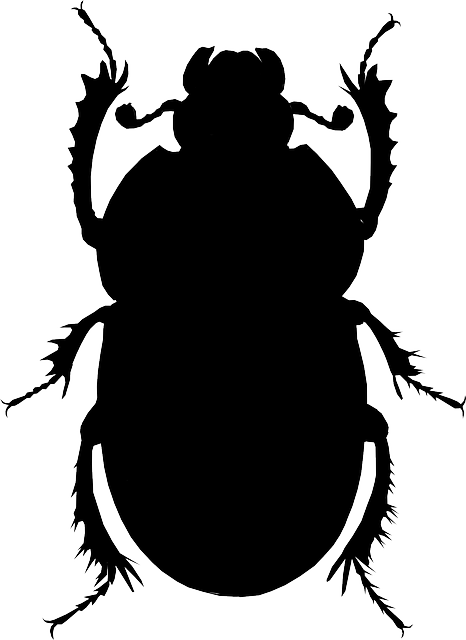Foreign Grain Beetles (Anobiidae) are wood-boring pests that infiltrate homes and commercial spaces through hidden tunnels. With a lifecycle involving egg deposition in wooden structures and larvae feeding on wood, their presence can go unnoticed until adult beetles emerge during seasonal transitions. Professional cleaning, sanitation, and specialized equipment are crucial for effective removal. Exterminators use safe insecticides and thorough cleaning to eliminate beetles and larvae. Residential properties require regular inspections and preventive measures, while commercial spaces necessitate tailored control solutions from experienced professionals due to unique challenges. Effective sanitation techniques involve vacuuming and deep cleaning with powerful disinfectants. A strategic approach combining thorough cleaning, sanitation, and targeted treatments offers long-lasting protection against future infestations.
Professional cleaning and sanitation are essential for eliminating foreign grain beetle eggs and larvae, ensuring a safe and healthy environment. This comprehensive guide addresses the intricate process of removing these persistent pests from both residential and commercial spaces. We explore the life cycle of foreign grain beetles, highlighting the need for expert intervention. Through effective sanitation techniques, we provide strategies to combat egg and larva presence. Additionally, we offer insights into choosing sustainable pest control solutions for long-term prevention, offering peace of mind in a bustling world.
Understanding Foreign Grain Beetles and Their Life Cycle
Foreign Grain Beetles, scientifically known as Anobiidae, are a common yet insidious pest that can infiltrate homes and commercial spaces through hidden pathways. These tiny creatures, often referred to as wood boring beetles, have a remarkable life cycle. The female beetle creates narrow tunnels in wooden structures, depositing her eggs within these galleries. Within a few weeks, the eggs hatch, revealing larvae that feed on the wood, burrowing deeper into the material. This destructive behavior can go unnoticed for years until the presence of adult beetles is confirmed, often during seasonal transitions when they emerge to mate and lay new eggs.
Professional cleaning and sanitation are crucial steps in combating this pest. Skilled exterminators employ specialized equipment to locate hidden infestations, ensuring every corner of affected areas is treated. They use powerful yet safe insecticides to kill existing beetles and larvae, followed by thorough cleaning to remove any residual debris or egg cases. For residential properties, regular inspections and preventive measures are recommended, especially in regions with warmer climates where these beetles thrive. Commercial spaces face unique challenges due to their larger size and diverse structural elements, requiring tailored beetle control solutions from experienced professionals.
The Importance of Professional Cleaning for Effective Removal
Professional cleaning and sanitation are paramount when it comes to effectively removing beetle eggs and larvae, particularly foreign grain beetles (also known as stored product pests). These tiny invaders can lay their eggs in various grains and foodstuffs, leading to infestations that are both challenging and time-consuming to eliminate. Relying on professional grain beetle extermination services is crucial for achieving a thorough and lasting solution.
Expert pest control specialists employ specialized equipment and know-how to locate and destroy every stage of the beetle lifecycle. They understand that simply cleaning surfaces isn’t enough; sanitation must target hidden crevices, storage areas, and infested items. Professional grain beetle treatment involves meticulous decontamination procedures, ensuring that any eggs or larvae surviving the initial cleaning are eradicated. This comprehensive approach is essential for preventing reinfestation and providing effective beetle control solutions in both residential and commercial settings.
Sanitation Techniques to Eliminate Beetle Eggs and Larvae
Effective sanitation techniques are paramount in eliminating foreign grain beetle eggs and larvae, ensuring their complete removal from affected areas. Professional cleaning involves a systematic approach to identify and eradicate these pests, which often hide in hard-to-reach spaces. Trained technicians use specialized equipment to vacuum and clean surfaces, removing any debris or infestations that may contain eggs or larvae.
In commercial settings, deep cleaning protocols are implemented to address large-scale infestations. This includes sanitizing floors, walls, and baseboards with powerful disinfectants to kill any surviving beetles, eggs, or larvae. Residential treatments focus on similar comprehensive strategies, targeting not just visible adults but also the hidden eggs and larvae that pose the greatest threat.
Choosing the Right Pest Control Solutions for Long-term Prevention
When it comes to tackling foreign grain beetle infestations, selecting the appropriate pest control solutions is key for long-term prevention. Professional exterminators offer a range of options tailored to both residential and commercial settings, ensuring effective removal and future protection against these pesky creatures. One commonly recommended approach is a multi-step strategy involving thorough cleaning, sanitation, and targeted treatments.
For instance, professional grain beetle extermination often includes deep cleaning to eliminate any visible signs of the insects and their eggs or larvae. This may involve scrubbing surfaces, vacuum cleaning, and removing infested items. Sanitation practices, such as regular disposal of waste and proper storage of food, are also crucial to disrupt potential breeding grounds. Additionally, applicators may use specialized insecticides or dusts that target beetles specifically, ensuring minimal impact on non-target organisms while providing long-lasting protection against future infestations.
When dealing with foreign grain beetles, a comprehensive approach is key. Understanding their life cycle and implementing robust sanitation practices are essential steps in professional grain beetle extermination. By choosing the right pest control solutions, whether for residential or commercial spaces, you can achieve long-term prevention, ensuring these pests don’t return. Effective treatment involves addressing the source, removing infested materials, and employing targeted insecticides to eliminate eggs and larvae. Remember, prompt action and regular maintenance are vital to keeping your environment beetle-free.
